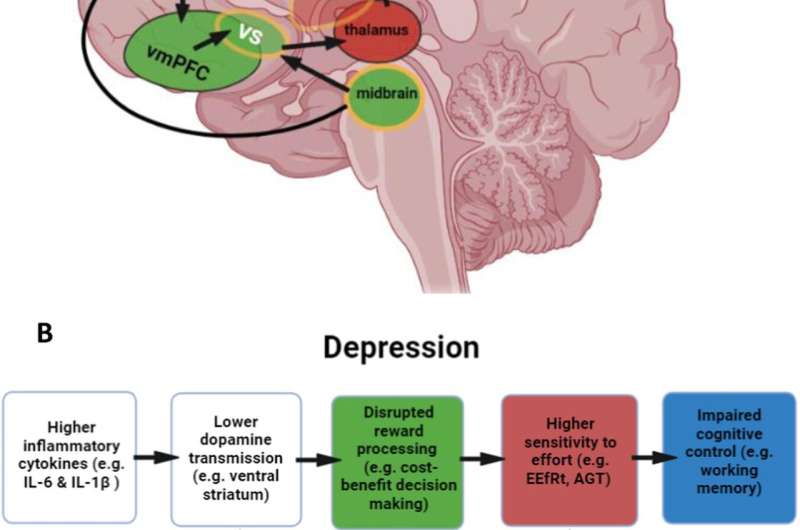
A mechanistic pathway for depression modulated by physical activity. debt: Translational psychotherapy (2024) DOI: 10.1038/s41398-024-02922-y
UCL researchers have explored the processes in the brain and body through which physical exercise reduces depressive symptoms.
Depression is the leading cause of disability worldwide and is associated with disturbances in several brain and psychological processes, including poor learning and memory. Physical activity, particularly aerobic exercise, has been found to reduce depressive symptoms, but until now the processes behind this have been poorly understood.
In a new review article published in Translational psychotherapy, researchers propose a new hypothesis to understand the antidepressant effects of exercise. They believe that this process depends on motivation and is critical for alleviating a number of symptoms of depression, such as anhedonia (lack of interest or joy in life experiences), low energy, and “brain fog.”
The team summarized research papers that explored the mechanisms of depression in both humans and animals and concluded that depression, particularly anhedonia, is associated with elevated inflammation (caused by the body’s immune response). Importantly, inflammation is also linked to disrupted dopamine transmission. These biological differences may represent key processes leading to changes in motivation, particularly a reduced willingness to exert physical or mental effort.
Meanwhile, exercise reduces inflammation, increases dopamine activity, and increases motivation. Researchers believe this may be an important reason why exercise has an antidepressant effect.
Chief Editor, Dr. Emily Hird (UCL Institute of Cognitive Neuroscience) said, “The antidepressant effect of aerobic exercise has been convincingly demonstrated through randomized controlled trials, but its mechanisms are not well understood. This is, in part, because it may involve various biological and psychological factors. processes.
“For example, in addition to its positive effects on inflammation, dopamine and reward processing, exercise reduces oxidative stress and improves self-esteem and self-efficacy.
“However, we suggest that exercise—especially aerobic activity that gets you sweaty and out of breath—reduces inflammation and increases dopamine transmission, which increases the desire to exert effort and therefore generally increases motivation.”
The team hopes that this understanding of how exercise can reduce symptoms of depression will help develop new treatment strategies, such as personalized exercise programs.
Dr Hurd said, “Understanding the mechanisms underlying the antidepressant effects of physical activity in depression can inform our understanding of the mechanisms that cause depression and the development of new intervention strategies, particularly personalized interventions and social recommendations.”
To further test their hypothesis, the researchers recommend that larger randomized controlled trials be conducted that assess the antidepressant effects of exercise, and measure the effect on variables including inflammation, dopamine transmission and motivation.
It will also be important to investigate potential barriers to exercise.
“Addressing barriers to exercise is particularly important for people with depression, as regular physical activity can help alleviate symptoms, improve mood and empower people on their path to recovery,” added Dr Hurd. , finding strategies to encourage exercise is key.”
More details:
EJ Hird et al, From movement to motivation: a proposed framework for understanding the antidepressant effect of exercise, Translational psychotherapy (2024) DOI: 10.1038/s41398-024-02922-y
Provided by University College London
extract: New clues point to how exercise reduces symptoms of depression (2024, July 29) Retrieved July 29, 2024 from https://medicalxpress.com/news/2024-07-clues-symptoms-depression.html
This document is subject to copyright. No part may be reproduced without written permission, except for any reasonable transaction for personal study or research. Content is provided for informational purposes only.
#clues #point #exercise #reduce #symptoms #depression

